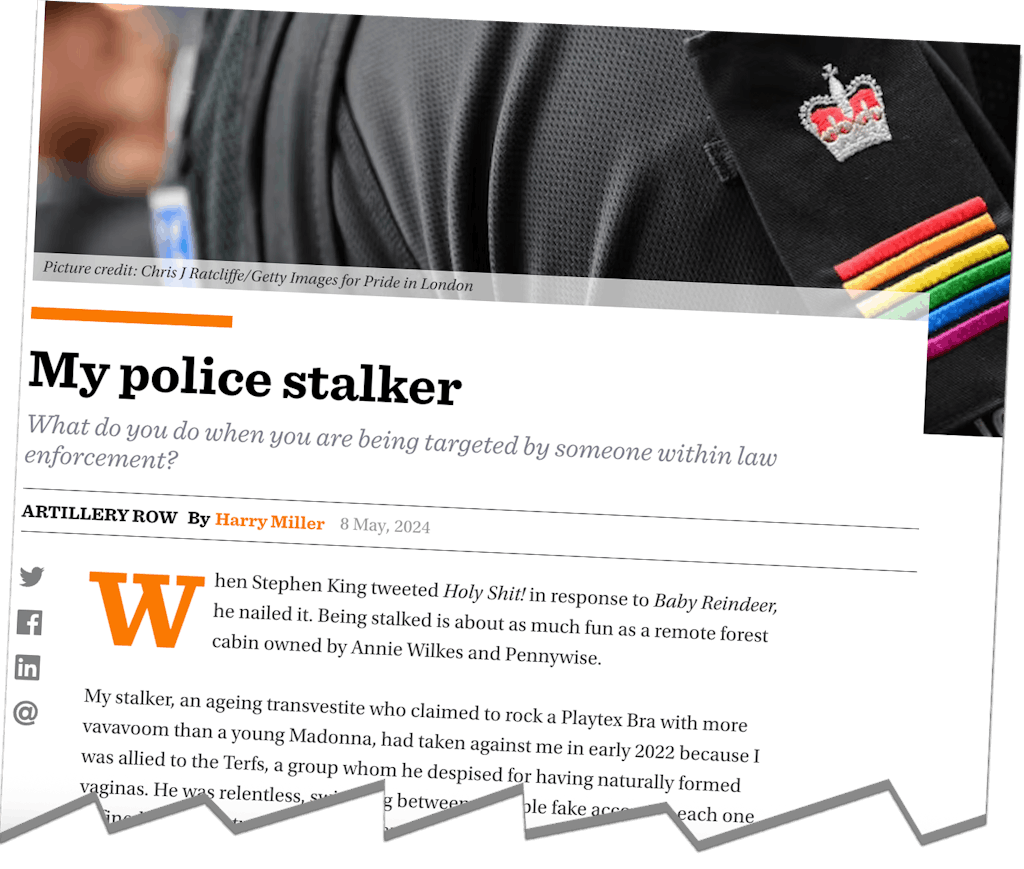A year ago, I wrote an article for The Critic called “My police stalker” in which I expressed misplaced compassion toward a former police officer who had threatened to have me shot. “I’ve won more gold on the ranges than you have in your rotting teeth,” he tweeted from the security of a police station where, since early 2022, he had conducted a campaign of harassment on the Leicestershire Chief Constable’s shilling. More recently, he’s called for the ethical assassination of Nazis. I, of course, am Nazi in Chief.
A senior officer had advised their DEI hire to protect the reputation of the force by conducting his campaign of stalking from behind the shield of sock accounts and multiple fake professional identities. As far as assignments go, this one was ideally suited for PC Watson who, since the 1990s has been cosplaying as a woman, a midwife, a model, a victim, a freedom fighter, a marksman, an expert on CIA activity on the dark side of the moon, and a police officer. If Watson was paid by an algorithm that combined the sheer volume of output with the square root of its absurdity, then that bulge in his trouser pocket would be the fruit of his labour.

Over the course of a single year, Watson proclaimed on social media that he had amassed sufficient evidence to see me convicted for, amongst other crimes, the bombing of a bar in Colorado in which Suella Braverman played the part of Ulrike Meinhof to my Andreas Baader. When MI5 refused to arrest the former Home Secretary, Watson doctored a picture of my wife in sandals and reported her to the anti terrorist unit for the possession of fascist feet.
There was a brief moment of hope one early morning in December 2022 when Watson, still in his nightie, was arrested on suspicion of harassment. He admitted everything, but was promptly back on duty the following day after The Crown Prosecution Service declined to run the case. Their argument was that, whilst it may not be nice for a police officer to call for the extermination of Nazis like me from the earth, to do so was merely an exercise in freedom of expression and thus nothing to do with them. The consolation prize was that, ten months later, Watson was fired.
Fair to say, the ex police constable did not retire to write his memoirs. Instead, he read some of mine, which is why on the anniversary of his sacking, I picked up the phone to Lincolnshire Police, who alleged that my article in The Critic had included a criminal misgendering, contrary to Section 179 of The Online Safety Act 2023.

Watson must have been hugging himself with delight at the turnaround when the case bypassed uniform and went directly to CID. One imagines a gruff Jack Meadows type standing in front of a white board and crunching up Styrofoam coffee cups as he growls at his team of detectives. “Our primary suspect has form. He’s the villain who turned off the rainbow lights at police HQ right under our noses. Any officer messing up on this one will be back in uniform and lucky to be assigned to a lollipop crossing. Now come on. Let’s roll!”
A Detective Sergeant called whilst I was mowing a neighbour’s lawn and made an offer I could not refuse. I was to hand myself in for interview under caution or risk having the bracelets snapped on. I’ve been arrested before, and it’s not an experience I’d rush to go through again. At the station, the detective proffered a hand, as if greeting the rep from a taser supplier prior to a meeting with coffee. I declined. The officer advised that I was free to leave at any time, but that if I chose to take up that option, arrest was on the table. Joseph Heller coined a phrase for this dilemma, as I recall. The tape went on, and the following exchange took place:
Detective Sergeant: Did you write The Critic article about Lynsay Watson?
Me: Yes. What’s the offence?
Detective Sergeant: Maliciously spreading false information with the intention of causing non-trivial psychological harm to the victim.
Me: I didn’t spread false information.
Detective Sergeant: You referred to the victim as a he.
Me: Firstly, he’s not the victim. Secondly, he’s a man.
Detective Sergeant: I’m not saying Watson is a he. I’m not saying that Watson is a she. I’m saying that person is saying that she’s a she, and you’re making numerous comments in relation to that person not being a she; instead, being a he. A crossdressing copper. A lunatic.
Me: That’s because he is.
The absurdity of this interrogation, which has been transcribed word for word, defies explanation. That is, until now. Let me posit, for a moment, the existence of the Trans Boson Particle (Symbol: Tº ), which appears to find its catalyst beneath the soft blue light of a police station. Whilst the particle itself remains elusive, its effect on due process, rationality, evidence, sight, sound, and the entirety of British jurisprudence is all too easy to observe. It explains how a call by a trans copper for the ethical assassination of his political enemies is perceived as having less weight than a comedy writer’s suggestion that we kick these nutters in the balls. And the existence of the Tº particle is the only plausible explanation of how a detective sergeant, who presumably manages to get dressed each morning without putting his trousers on backwards after wiping his ass with a toothbrush, was able to read the article in The Critic and conclude that Watson was the victim. The Tº particle is real. It rearranges reality in order to look after its own.












